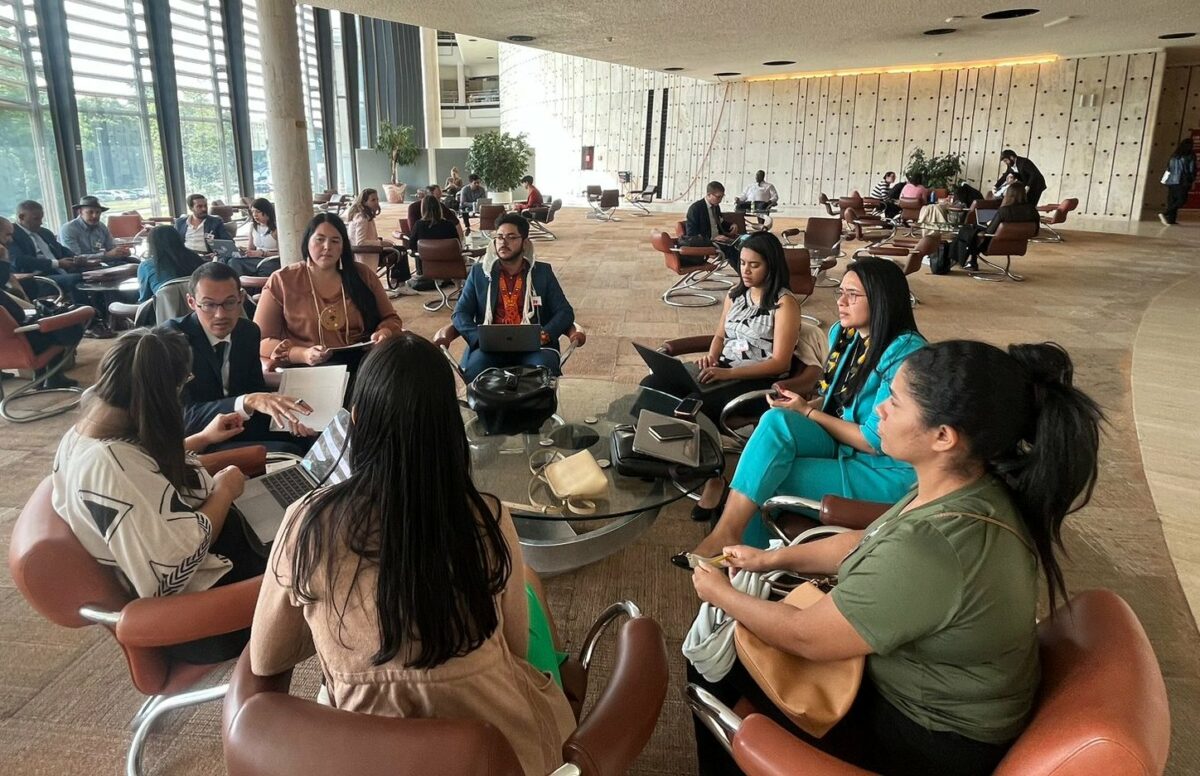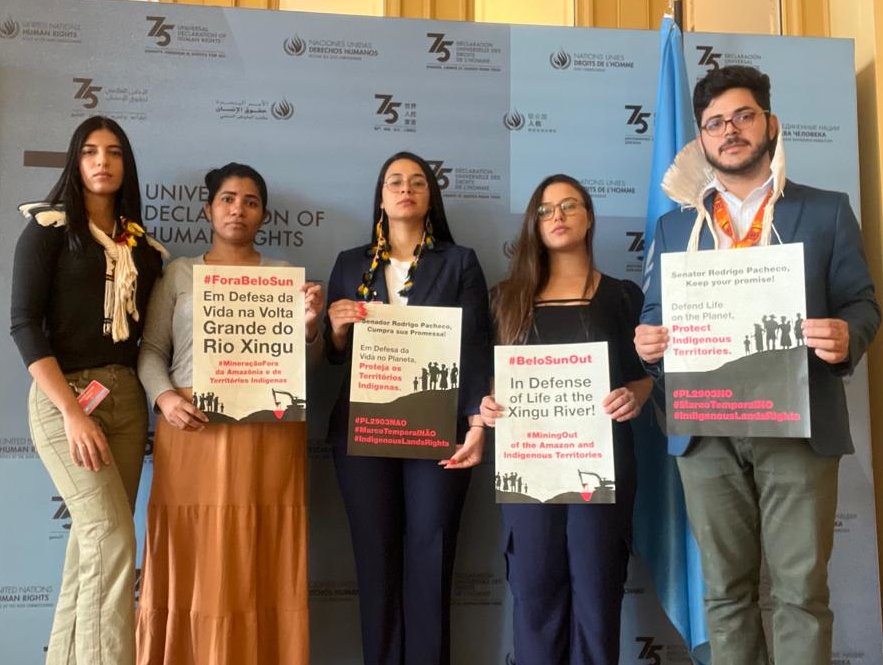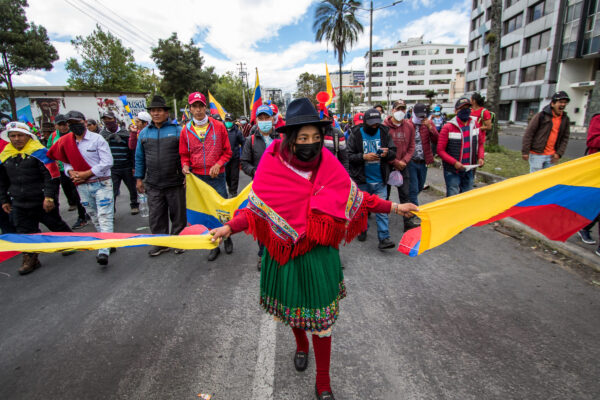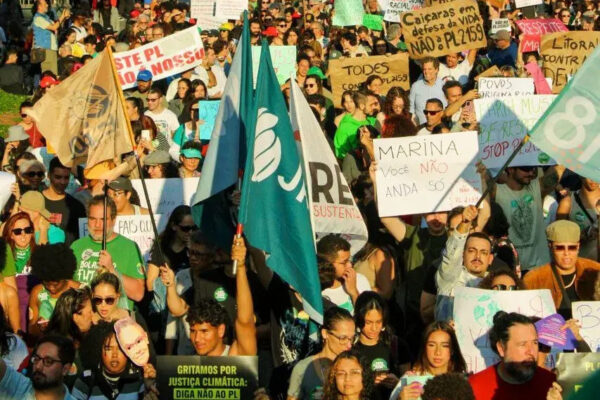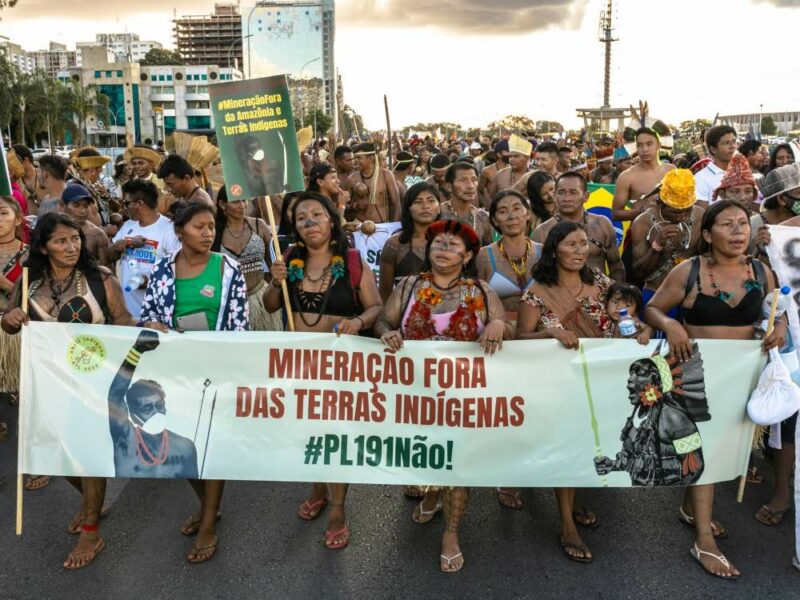Indigenous people have found themselves at the forefront of another battle against corporate giants that exploit the Amazon’s resources without a second thought about the consequences. This time an unlikely target emerged: Canada.
Ahead of the United Nations’ Universal Periodic Review (UPR) scheduled for November 10, 2023, Amazon Watch accompanied a coalition of Indigenous leaders, local communities, and Latin American civil society representatives to Geneva, Switzerland, during the last week of August. Together, we exposed the predatory practices of Canada’s extractive sectors operating in Latin America and the Caribbean, actively supported by the “economic diplomacy strategy” of the Canadian government. This delegation has since delivered the urgent message that we must join them in “unmasking” Canada’s role in human and environmental rights violations.
This is the result of meticulous work by Amazon Watch and more than 50 civil society organizations who have come together to compile three critical reports under the campaign “Unmasking Canada: Rights Violations Across Latin America.” These documents are a collective demand for accountability, targeting corporate abuses linked to 37 Canadian projects across nine countries in Latin America and the Caribbean.
One of the key documents in this campaign is “The Canada Amazon Report.” This report shines a spotlight on the abuses and rights violations connected to mining and oil extractive projects in Brazil, Colombia, Ecuador, and Peru. These projects are controlled by 16 Canadian companies and supported by Canadian banks. The consequences of their actions are devastating, causing severe damage to biodiversity, forests, and waterways.
Perhaps the most heartbreaking aspect of these violations by Canadian corporations is the impact on Indigenous peoples and local communities. In the Amazon rainforest, which stretches across these four countries, 10 of the projects directly affect Indigenous peoples from at least 16 ethnic groups.
“The case of my region, Volta Grande do Xingu, is a clear example of the [harmful impacts of mining on ecosystems, Indigenous communities, and human rights]. Canadian mining company Belo Sun is looking to build the largest open pit gold mine next to the third largest hydroelectric dam in the world that has already impacted our lands and lives for years.
“The explosions at the mine, if built, could cause the Belo Monte dam to burst and, even worse, the mining company’s own tailings dam, which provides for the use of cyanide – an extremely toxic substance – which would lead to irreversible contamination and the death of the Xingu River. We need to stop Belo Sun before it’s too late,” said Lorena Curuaia, Vice President of Iawá Community.
It also affects traditional communities such as riverine communities and those living in protected areas, land reform settlements, and rural communities. These communities have inhabited these lands for generations and have a deep connection to their environment.
The Amazon rainforest is not just a local treasure; it’s a global lifeline. Covering 85% of the Amazon, these four countries are home to this magnificent tropical forest, which boasts the greatest biodiversity on Earth. Beyond its incredible flora and fauna, the Amazon plays a key role in mitigating the climate crisis, as confirmed by the Intergovernmental Panel on Climate Change. Protecting it is not just a regional concern but a global imperative.
Violations unveiled
The rights violations discovered in the operations of Canadian companies in the Amazon rainforest of these four countries are deeply troubling, particularly considering Canada’s efforts to present itself as a human rights leader in the world. We cannot remain silent in the face of such blatant violations.
The delegation’s journey to Geneva represents a powerful force in the fight for human rights, a chance to unmask the wrongdoings of Canadian extractive industries in Latin America and the Caribbean. It’s a call to action for the global community to demand accountability and justice for those who’ve faced harm by Canadian corporations.
Among our recommendations is a call to member states to compel Canada to establish a comprehensive and binding human rights and environmental due diligence law, according to international human rights standards, to prevent and sanction any form of corporate abuse of Canadian companies and their global supply chains, as well as banks financing those operations. Many recommendations are the culmination of work the Amazon Watch team has documented in earlier reports such as the Risks of Investing in Belo Sun and the Risks of Investing in Solaris Resources. It also marks the beginning of our new journey toward international advocacy work for the protection of the Amazon – and our climate at large.
Our planet’s health is interconnected, and when abuses occur in one corner of the world, they reverberate globally. Let us be in solidarity with the Indigenous peoples and local communities of Latin America and the Caribbean, demanding that Canada’s extractive sectors be held accountable for their actions. It’s time to unmask the predators and protect the precious ecosystems that sustain us all.



